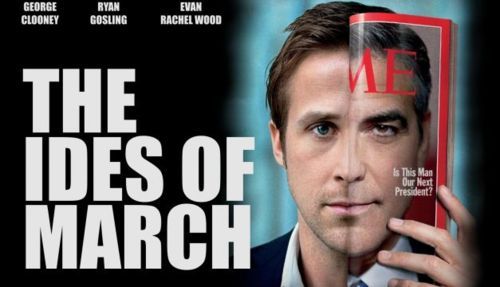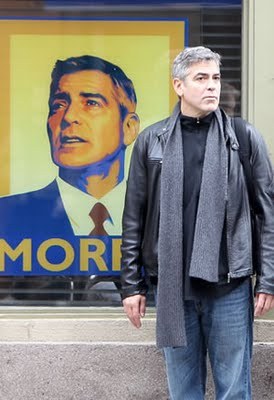
George Clooney has tried his hand at directing again with The Ides of March. Based on the 2008 play, Farragut North by Beau Willimon, the name was fittingly changed to reflect Ceasar’s days of betrayal as well as Shakespeare’s great work Julius Caesar. Clever Clooney puts many literary allusions to work. The plot, in short, focuses on a political race for the democratic seat where the real players are the men behind the scenes calling all the shots. On a larger scale, the film is a psychological drama set in a political arena that revolves around thematic ideals of loyalty and allegiance – but at what cost to individual honor? The opening scene shows Stephen, the young campaign manager played by Gosling, as he checks the stage and microphone for the Governor’s (Clooney) debate already suggesting that he is the puppet master. The film continues with the fight for the democratic seat, as the moral ambiguity of the central characters (played by Gosling, Clooney, Hoffman and Giamatti – all finely acted, we already know they are good at their craft) creates a thrilling power struggle until the end. It also makes us question who the good guy is and who the bad guy is as ideals and allegiances change.

The film contains realistic character studies of people in the political realm which will strike close to home with the upcoming elections in Washington. Aside from the political jargon that might float over your head, Clooney and his team did a great job with the script adaptation and dramatic dialogue. But the climax of the film that shifts the choice and path of the characters has holes. The intern, a title that already makes one think “sex scandal,” played by Evan Rachel Wood, lacks character development. Her eventual situation with the governor and tragic demise (however Ophelia-esque it might be, since Clooney is clearly thinking of Shakespeare) lacks credibility. We don’t know enough about her past to make her actions realistic, which unfortunately leads to plot holes, and takes away from the film at a pivotal moment.
The visuals and camera work border on corny, and Phedon Papamichael’s cinematography plays it safe. The camera lingers too long on Gosling silhouetted by the giant American flag that takes up the screen. In another emotional moment, he cries as the rain beats down on the windshield. The lack of subtlety leaves nothing to the imagination. However, I did like the close ups on intimate conversations. For example, the shot of Gosling and Wood flirting in the bar draws us in and suggests the secrecy of politics in general; the framing is suggestive and dangerous. The musical score creates a jarring turn that reflects the anger and revenge Gosling feels towards the Governor. But other musical moments, for example the random jazz song that gets too much camera time in the bar, seem out of place and without reason.
At the end of the film Gosling confronts Clooney in the shadowed kitchen of a closed restaurant – an almost mafia moment – where he proclaims “you don’t fuck the intern.” This political cloak and dagger again alludes to Shakespeare’s play and shifts the power back to Gosling. For him, the end will justify the means even if it calls for blackmail. The final shot is a slow zoom to an extreme close up on Goslings face, with his ear piece, as the face of the governor’s campaign. He now has all the power, but we are left to wonder what he will do with it.

For more reviews visit My State of Film
